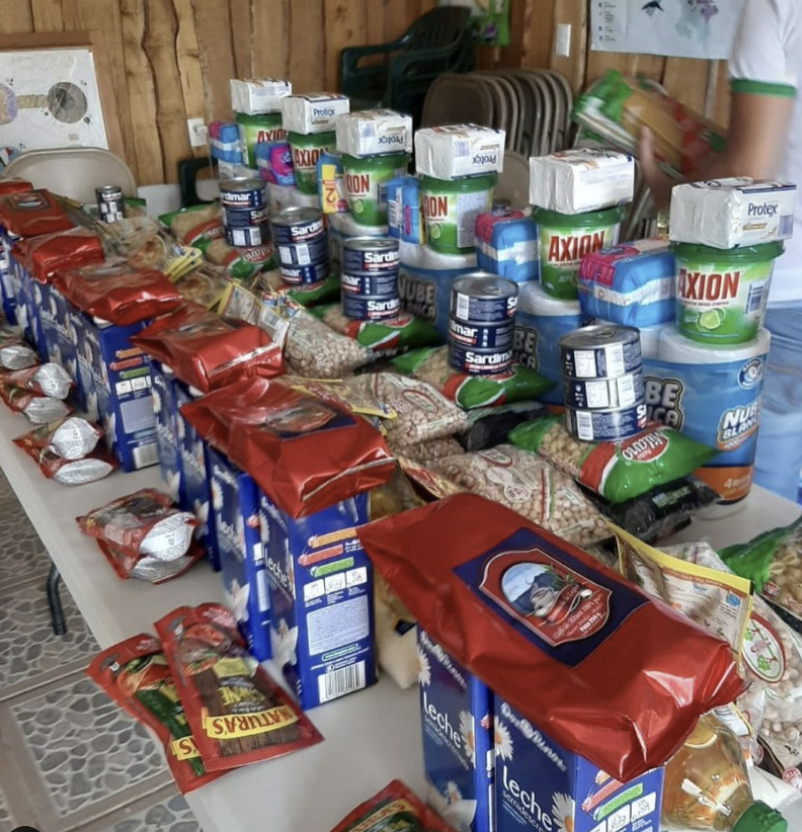Care Packages 2.0: Addressing Food Insecurity in Coffee-Producing Communities
When the COVID-19 pandemic entered our lives at the beginning of 2020, almost everyone saw their work affected in some way. But for smallholder women coffee producers, who can struggle to make ends meet even in ‘good’ years, the disruption stemming from the pandemic posed a real threat to their livelihood. One of our partner producers shared with us that 70% of her contracts had been canceled due to COVID-19 and that her household was experiencing food insecurity as a result. In April 2020 we decided to survey our partner producers in order to understand just how widespread the problem was.
Credit: Alexa Romano
Of the 67 families surveyed, 26 (39%) were facing food insecurity. Having heard from the communities that food baskets would be a helpful temporary measure, we, therefore, launched a simple platform for producers to sign up to receive one, initially for 3 consecutive months. To this end, we started fundraising for the project, which we called Care Packages, putting any profit from coffee sales during this time period towards it, and accepting donations from Costa Rican and US companies, as well as from individual donors. Following our initial success, we extended the project for a further 2 months through crowdfunding, which allowed us to provide food baskets for a total of 5 months in 2020 (June to October), for 26 families, reaching at least 100 people.
Instagram post from July 2020, after the first month of supplies, was provided to 26 smallholder women and their families.
At first, we saw the food insecurity of some of our producers as a pandemic-related problem and had therefore not imagined extending the Care Packages beyond 2020. However, as the pandemic became more prolonged and rates of COVID-19 in Costa Rica once again rose in April 2021, we discovered that some of our partner producers were once again struggling with food scarcity. We began to understand that the problem of food insecurity among coffee-growing families is not simply a one-off issue caused by the pandemic: in many cases, it is a chronic, seasonal problem, with its roots in causes as diverse as climate change, fluctuating food prices, monocropping, and natural disasters. Consequently, we decided to re-open our platform, and this year received applications from 25 families, many of which signed up for the first time. In these food baskets, we include basic household items and staple foodstuffs, including beans, grains, and soap.
So, why food baskets?
Initially, we decided on food baskets simply because we were listening to what our producers considered would be most helpful. We intended it to be a one-off measure, but we soon came to the conclusion that whilst the pandemic has certainly exacerbated food insecurity, it is not a new problem for smallholder coffee farmers. This is particularly significant since, while many assume that natural disasters and conflicts are the greatest causes of malnutrition, chronic seasonal hunger is actually the most common cause. As Robert Chambers notes in his book, Seasons of Hunger, ‘seasonal hunger is the father of famine’. It is therefore essential that we future-proof coffee-producing communities, and view food insecurity in terms of sustainable, long-term programming.
We still very much see baskets as an intermediary measure, and we are very conscious of not creating a long-term dependency in our partner communities. Looking to the future, we are currently researching the situation in more depth and analyzing possible strategies for the future, which may include elements such as educational workshops on nutrition and setting up home gardens or even assisting with farm diversification. Look out for our report which we hope to publish in the coming months! Alongside this, we are working on research on what constitutes a thriving income for coffee-producing families, which we hope will complement our food security work by setting a clearer baseline of acceptable prices for coffee.
Our long-term goal is that our assistance will no longer be needed and that producers will be able to receive a thriving income from their coffee production and other endeavors. In the meantime, we are delighted to be able to help out even in a small way, thanks to the support of our sponsors, Western Union and Neues Schwarz.
Written by Alice Mee




